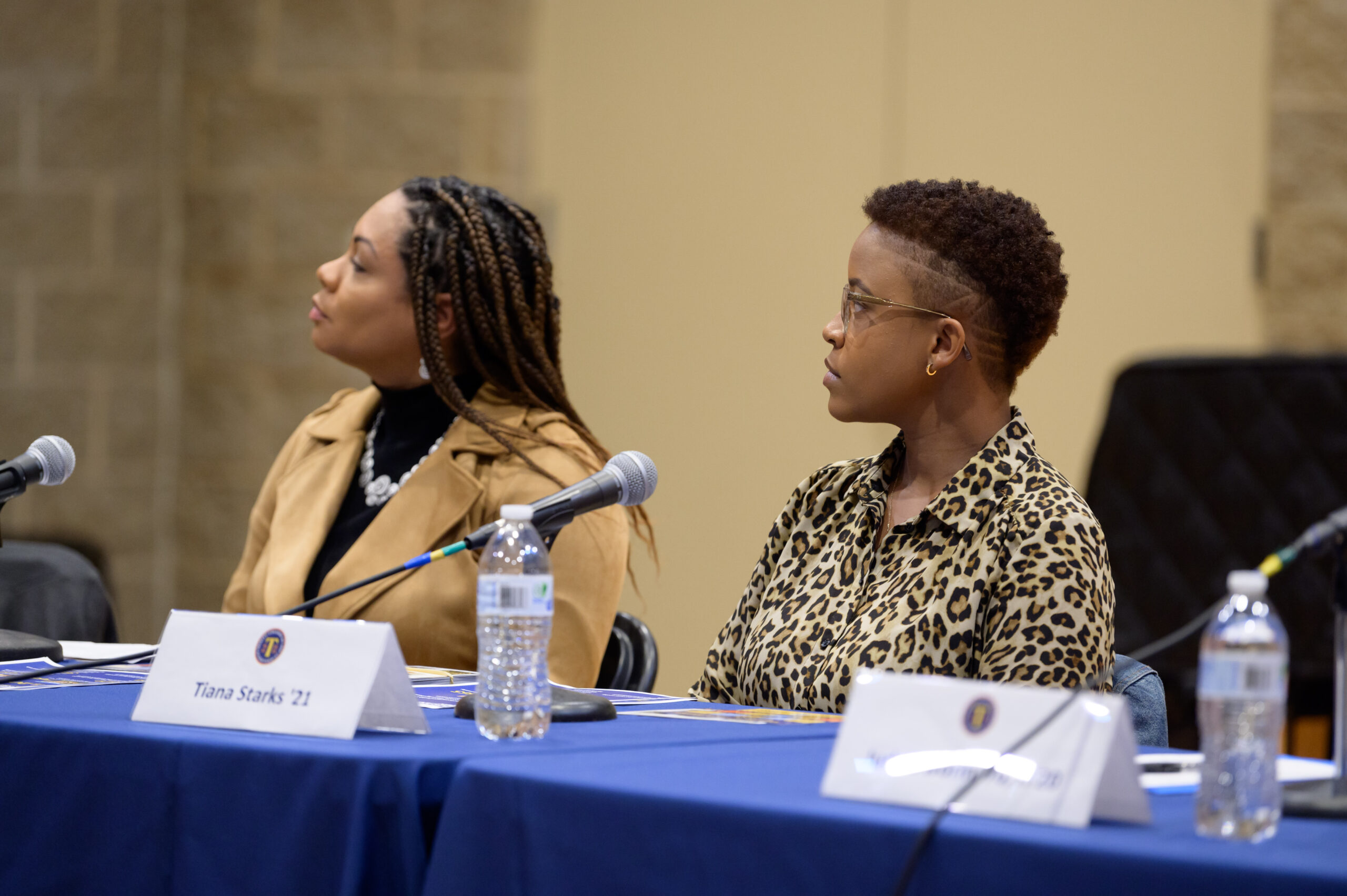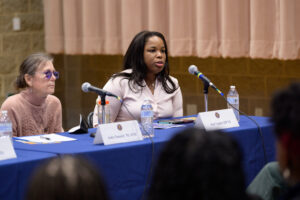CHER Hosts Panel on Trinity’s Commitments to Hartford During Trinity’s November Bicentennial Symposium
On November 14th, Trinity College’s Center for Hartford Engagement and Research (CHER) hosted a panel discussion reflecting on Trinity’s commitments to Hartford as part of the College’s Fall Bicentennial Symposium. The panel featured four Trinity alumnae from different eras, who are leaders in Hartford, including:
- Judy Dworin ’70, founder of Trinity’s dance program and the Justice Dance Performance Project
- Jacquelyn Santiago Nazario ’00, CEO of Compass Youth Collaborative
- Kae Taylor ’15, Director of Hartford’s Office of Equity and Opportunity
- Tiana Starks ’21, Community Impact Associate at Hartford Foundation for Public Giving
Speaking to an audience of Trinity faculty, staff, students, and alumni, as well as community partners and students from Hartford Magnet Trinity College Academy, the panelists reflected on how Trinity’s relationship with Hartford has changed over time. They also shared ideas for strengthening the partnership between the College and the community in Trinity’s subsequent 200 years. The panel’s moderator, Professor Abby Fisher Williamson, then CHER director, began by asking the panelists to describe what the relationship between the College and Hartford looked like when each panelist was a student. Judy Dworin recalled that the late 1960s were marked by open curricula and active engagement with the city during the Vietnam War protests.

In contrast, Jacquelyn Santiago Nazario highlighted the challenges she faced in the late 1990s, noting the College’s lack of diversity and the disconnect between the student body and the Hartford community. She reflected: “I remember going out one day to explore the neighborhood and when I came back my friends and classmates said ‘You went out there?’ They were shocked to know that I chose to go outside the gates as if Hartford was an unsafe new world out there.” Recent graduate Tiana Starks similarly felt the contrast between her upbringing in Hartford and her experience on campus, saying that Trinity felt like a different state despite being only six minutes away from home.
Kae Taylor attended Trinity in the Individualized Degree Program (IDP) for adult leaders, graduating in 2015. She reflected on how that program bridged relations between the city and the College by bringing Hartford adult learners into Trinity’s classrooms. Taylor, who serves on CHER’s Community Advisory Board stated that the College’s commitment to engaging with Hartford has improved over time, especially with a greater focus on diversity, equity, and inclusion.

As the discussion shifted towards envisioning the future, the panelists shared their dreams and aspirations for Trinity’s involvement in Hartford. Tiana Starks envisioned the removal of the College’s gates and a deeper commitment to understanding the Hartford community. Kae Taylor emphasized a commitment to quality education for Hartford’s youth, while Judy Dworin similarly considered expanding efforts to bring Hartford youth to Trinity for events and other learning opportunities. The panelists collectively stressed the importance of the College’s active engagement, suggesting that finding additional ways to invite neighbors to Trinity events could be a simple yet effective way to bridge gaps and build relationships.
Kae Taylor prompted a thoughtful reflection on how a selective liberal arts institution could be truly welcoming to all facets of the surrounding community. The panelists concluded that effective higher education engagement requires humility and an ongoing commitment to dialogue. The panel proposed considering mandatory community engagement for Trinity students, while at the same time recognizing the need to prepare Trinity students for ethical and respectful partnerships. The symposium panel discussion offered valuable insights into the past and present of Trinity’s relationship with Hartford and allowed introspection on dreams for the future.
